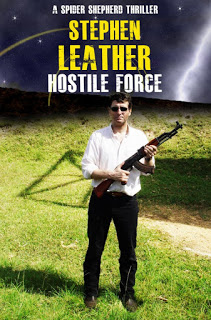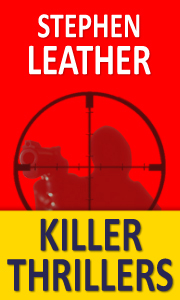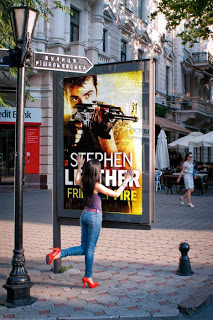Getting Published - Stephen Leather

First write your book. There’s a difference between wanting to be a writer and actually being a writer and the difference is putting in the hours. You have to want to write; it’s hard work and it’s lonely work. I haven’t met a writer yet who actually enjoys the process. It’s lonely, it’s often boring, and it’s hard on the fingers if you’re as bad a typist as I am. I’m not saying that writing isn’t fun, it can be or I wouldn’t do it, but the process itself isn’t enjoyable. And it takes months, if not years, to write a book. I always tell aspiring writers that ninety per cent of writing is stamina and self-motivation.
It is possible to submit outlines, but unless you’ve a proven track record or you’re famous for something else (you’re a well-known comedian, for instance, or you’ve killed somebody famous) then an agent or publisher is going to want to see the completed manuscript before offering to buy it. So before you start looking for an agent or a publisher, finish the book. Read it. Polish it. Get it as close to perfect as you can. Give it to a friend that you trust and listen to what they say. Maybe join a writing group and run it by the other members. Polish it again until you are absolutely happy with it. Then, and only then, start submitting it. You’ll only get one chance. It’s no good going back to a publisher or agent who rejected your book and saying ‘please have another look, I’ve improved it’ because they won’t.
In the old days – when I started writing – manuscripts had to be submitted on paper and had to be double-spaced and typed on only one side of each sheet. These days most agents and publishers will accept submissions by email, which is a huge saving on paper and postage!
Buy a copy of The Writers and Artists Yearbook for information on how to submit your work, and who to submit it to. If you’re on a tight budget, most libraries will have copies. I was first published after submitting my book Pay Off direct to half a dozen publishers. Back then (in the 1980s) most publishers had what they called slush piles, where unsolicited manuscripts were put on a desk and either looked at by a full-time reader or by any member of staff who might be interested. I was plucked from the slush pile at Collins and lots of writers came through Hodder and Stoughton’s slush pile.

There was a time - after I had been published - when publishers refused to look at unsolicited manuscripts. What changed? Technology changed. When I first started writing fiction, the only option was to do it by hand and then type it out, sheet by sheet. If you made a mistake, you had to retype the sheet. And as publishers wouldn’t accept carbon copies, you had to type out a fresh manuscript for each publisher. I was lucky and had an IBM golfball typewriter but even that only had a five-page memory. I had to type in five pages, print out half a dozen copies, and then delete what I had written and type in the next five pages. It took me weeks of hard work to print out the six copies of Pay Off that I submitted.
These days writing is easier, because it’s all done on computers, and you can print out as many copies as you want at the touch of a button. As a result, publishers were deluged with manuscripts and they no longer found it cost-effective to read them. They effectively subcontracted out the initial sifting to agents, hoping that they would separate the gold from the dross. Agents didn’t have the staff to deal with the tsunami of manuscripts, which is when the rot really set in. Agents abused their power as gatekeepers by simply ignoring most writers. Time and time again I have been contacted by writers in despair because agents will not even acknowledge their emails or letters.
Nowadays publishers are looking at unsolicited manuscripts again so it is worth writing to editors. Just bear in mind that it is a long shot. Again, sell yourself and flatter them and maybe, just maybe, they might look at what you’ve written. But do bear in mind that your email might not get to the editor, it might be intercepted by an eager assistant. And don’t try phoning them – that is a total waste of time. Again, it is worth working any contacts you have. But don’t ask me or any other writer if we’ll read your work – we just don’t have the time and also won’t put ourselves in the position where we could be accused of plagiarism down the line! I know it’s frustrating, but the thing to remember is that nothing worth having comes easily.
Getting an agent
Getting an agent these days is difficult. I hesitate to use the word impossible, but for most first time writers I am sure it feels that way. In my experience, most agents lack even basic courtesy and don’t even reply to most writers who approach them. And it’s been that way for many years. I wrote to five agents after I’d written my first thriller - more than thirty years ago - and not one even bothered to reply. Even when I had three books in print and was trying to get an agent for The Chinaman, only two agents out of six replied to my letter. If they won’t even reply to a published author and former Fleet Street journalist, what chance does a first-time writer have? And if anything, it has got worse since then. I am contacted regularly by frustrated writers who are simply being ignored by agents. You’re just going to have to accept that getting an agent is no easy task, no matter how good a writer you are or how good your book is. I’m sorry, but that’s the cold hard truth of modern-day publishing.
Most agents these days have websites and on those websites they will explain their policy on submissions. When I first started you had to send a pristine typed manuscript. That's all changed, these days it’s all done by email. So send the manuscript, but bear in mind that you also have to sell yourself. You need to convince them that they need to read your work. If you’ve written a thriller, then push your military background if you have one. If you’ve written a book set in a school and you were a teacher, mention that. If you’ve written a crime novel and have spent time in prison, sell that. Push yourself as much as you push your book.

The Writers and Artists Year Book has a comprehensive list of agents in the UK, Ireland and the United States. Or you can Google ‘Literary agents who take submissions’. Write to them all. Every one. That’s the beauty of the new technologies, you can send a hundred emails as easily as one. Agents would prefer that you approach them one at at time, but as most don’t reply they have no right to ask that. Write to every agent you can. Dozens. Hundreds, if you want. Emails are free. If an agent really wants to represent you, he’s not going to care who else you approached.
In your email, promote yourself but flatter the agent. Find out who they represent and tell them what a great job they are doing for such-and-such a writer and that you think they’d be the perfect agent to handle your book. That’s how I got my first agent – I wrote Gerald Seymour’s agent a flattering letter and he took me on. He eventually sold The Chinaman and The Vets for a good six-figure sum. He went on to become an absolute nightmare - about which, more later!
Please don’t blame me if agents don’t write back. Most won’t even acknowledge receipt of your email. They can be very frustrating people to deal with. Just keep trying. Keep pushing. Work your contacts. Do you know anyone who works for an agency in any capacity? Did you go to school with someone who works for an agency? Start asking all your friends and relatives if they have any contacts. If it’s any comfort, the publishers I’ve spoken to all tell me the same thing – that if a book is good then it will be published eventually. Don’t forget that every literary agency has several agents, so if one agent says no it’s still worth approaching other agents at the firm. Writing is very subjective, and what one agent hates another might love. So keep on trying!
I am afraid I have a very low opinion of agents in general. That’s not an irrational dislike, it’s based on many, many bad experiences with agents. I’ll run a few by you and you can judge for yourself.

My first bad experience was with literary agent legend Michael Sissons, of Peters Fraser and Dunlop. He sold my book The Chinaman and The Vets to Hodder and Stoughton and I will always be grateful to him for that.
But he then joined forces with an agent called Peter Matson at Sterling Lord Literistic in New York. They got me a six figure deal with Simon & Schuster, which was great, but the deal turned out to be a disaster. Simon and Schuster did no marketing and no publicity and both books died. Peter Matson tried to move me to another publisher but he let Simon and Schuster find out. I had the most embarrassing lunch ever when Bill Grose of Simon and Schuster effectively slapped Peter Matson down in front of me and clearly took great pleasure doing it. I can still remember the evil smile on his face and the plate of untouched pasta in front of me. I have never had a US deal since.
I tried to talk to Michael Sissons about the US situation but he refused. By that point he had acquired something of a reputation for being grumpy and terse, and he was definitely that way with me! He refused point blank to discuss it with me. ‘I am not prepared to talk about it any more,’ he said. We parted company soon after.
After I split with Michael Sissons, I went looking for another agent and met Sonia Land of Sheil Land. Big mistake. She talked a good game and said she would go after more money for a two-book deal. I had written a book called The Stretch, which Sky One turned into a movie. She went to see my then editor - Jon Wood (of who more later) and phoned me next day to say that she hadn’t managed to get me any more money. It was a same again deal and she recommended that I accept it.
I phoned Jon and asked him what had happened. He said that it was a very strange meeting. Sonia had turned up with a large bag and asked him what he was prepared to pay for two more books from me. He said he was offering the same deal as he had offered for the two previous books and she said okay. Then she opened her bag, took out six manuscripts and spent the rest of the lunch pitching work by six other writers to him.
Jon thought it was hilarious. I didn’t, and parted ways with Sonia, who insisted on being paid her ten per cent commission, even though I never signed the deal. Back then agents took ten per cent. Now they take fifteen per cent. Do they do fifty per cent more work than they used to? No, they do not. So why did they all start charging more? It’s a question that no one seems able - or willing - to answer.
Anyway, I went on to deal with Hodder and Stoughton direct and negotiated a fifty per cent increase in my advance, for worldwide rights. And no, I would not recommend Sonia Land as an agent.

Jon Wood later became an agent himself, at RCW Literary Agency, having “left” the top job at Orion, which like Hodder and Stoughton is part of the Hachette group. I had lunch with him not long after he left Orion. It was a very strange affair, he launched straight into a long story about how he had been hankering after new challenges, pastures new etc etc. I listened and smiled and nodded, knowing full well that it hadn’t been his idea to leave. To add insult to injury, he asked me to pay for my lunch!
As part of the deal on leaving Orion, he was to act as Ian Rankin’s agent and take fifteen per cent of his earnings. That’s a hell of a deal, as Rankin’s last Rebus advance was seven figures, meaning Jon took six figures. I had just finished a book called The Runner and Jon said he would read it. A month later I hadn’t heard anything so I dropped him an email. ‘I’ve been busy, I’ll get right onto it,’ he said. Then nothing. I left it two years to the day before getting back to him, by which time I’d sold the book to Hodder and Stoughton.
He did have the good grace to apologise - he said he was very busy - but the damage had been done so I didn’t reply and I haven’t spoken to him since. I thought he treated me really badly and I am someone he worked with. In fact I was one of the first authors he edited, he wanted to move from sales to editing and Hodder asked me if I would take him on as an editor. I agreed, as a favour to Jon and to Hodder. He owed me and he still let me down, so I don’t expect new authors trying to break into the business will be treated any better. He wasn’t a great publisher - hence his departure from Orion - and I don’t think he’ll be much better as an agent, so no, I can’t recommend him.
For a few years I was represented by Julian Alexander of the LAW Agency, now rebranded as the Soho Agency. Julian dropped more balls than a juggler with Tourette’s. The Jack Nightingale series was cancelled by Hodder and Stoughton on his watch and he also lost me a publishing deal with Amazon. He failed to sell my standalone First Response, which I went on to sell to Hodder and Stoughton direct. I asked him to sell the foreign rights to my books - any of them - and he couldn’t. He did manage to sell the TV rights to the Nightingale books and to my standalone thriller The Runner but allowed both deals to wither and die. Oh, when he did the deal for STX to film my book The Chinaman as The Foreigner, he forgot to include flights to the premier as part of my package. I ended up having to buy my own plane tickets, though I did get to shake hands with Jackie Chan on the red carpet in LA so I guess it was money well spent! Ben Clark at the Soho Agency is a better bet, he handles the books I publish through Amazon’s White Glove program and is still young enough to be enthusiastic!
It is still worthwhile having an agent, if you can find a good one. But anyone who has tried to attract the attention of an agent knows just how difficult that can be! In 2022 I wrote a thriller called Triggers, about an assassin with multiple personality disorder and figured I would try to get an agent to sell it for me. I wrote to Ed Wilson of the Johnson and Alcock agency and sent him a copy of the manuscript. No reply. I wrote to Sam Hodder at Blake Friedman (twice). No reply. I sent the manuscript to two agents at Curtis Brown, one of the UK’s biggest literary agents. One agent, Gordon Wise, didn’t reply. That’s despite us both being selected by The Bookseller Magazine as being among the 100 most influential people in the book trade. I wouldn’t recommend him, obviously. I would recommend his colleague Sheila Crowley even less. Because I know her - she used to work for Hodder and Stoughton - I emailed her three times. She ignored the first two emails and then sent me a very frosty reply after the third when she realised I wasn’t giving up. She said she wasn’t interested and that no one else at the agency would be, either. Good to know that she speaks for all the agents there LOL! If nothing else it proved that she was actually receiving my emails and was ignoring them! If she treats me like that - a Sunday Times bestselling author who has sold millions of books - then I doubt she will be any more welcoming to unknown authors trying to get their first publishing deal. Not long after her frosty email, I saw her walking out of the lifts at Hachette’s HQ, laughing and joking with a couple of colleagues. The look on her face when she saw me was priceless, and she spent the entire walk to the exit avoiding eye contact with me. She knew she’d behaved badly. Anyway, I recommend giving Curtis Brown a miss, obviously.
Why are agents generally so unhelpful to aspiring authors? I think it’s because most really good agents are either just too busy, and the not-so-good ones have become disillusioned with the book trade. The hard fact is that advances generally have fallen dramatically over the past few years, which means that agents have seen their incomes fall, too. An average thriller or crime novel might now get an advance of just £10,000, which means the agent gets only £1,500. How hard are they going to work for £1,500? You know the answer to that!
Also, agents tend to have many, many authors on their books. Take a look at Jon Wood’s page on the RCW Literary Agency website, Jon has at least four dozen authors to look after including Ian Rankin, Steve Cavanagh, Joanne Harris and the estate of Terry Pratchett. Assuming he works a forty hour week, that means he devotes less than an hour a week to each of his authors. So said authors are paying fifteen per cent of their income for an hour a week. Is that a good deal? I guess you’d have to ask his authors!
So who would I recommend? That’s a tough question. Luigi Bonham (LBA Books) is a great agent. He read Triggers and we had a long chat about it but he’s not taking on new clients.

I did receive very nice emails from Richard Pike at the CWA Agency, Jamie Cowen at The Ampersand Agency, Harry Illingworth at the DHH Literary Agency, and Sian Ellis-Martin at Blake Friedmann. It’s definitely worth trying them, at least there is a chance they will acknowledge you! None of them wanted to try to sell Triggers, which was fine, and I went on to self publish it. It made close to £30,000 in its first year of publication, which is good going. If you are eventually rejected by every agent in town then there are two possibilities – either your book isn’t very good, or the agents are just incompetent. Either is a real possibility. But it might be worth having a closer look at your work, and try to be objective. Maybe the brutal truth is that your book isn’t as good as you think it is. Maybe it needs a total rewrite or maybe you need to start a new book. I think anyone who actually finishes a book deserves a pat on the back for that alone, but just because a book has been written doesn’t mean that it’s publishable.
One thing you must always remember is that agents are the middle-men in the publishing world. They are acting for writers (their clients) but the actual money comes from publishers. A writer has only one agent, but an agent has dozens, often hundreds, of writers, and will be dealing with all the major publishers. At the end of the day, an agent is not going to jeopardise his relationship with a publisher for the sake of one writer. Publishers are far more important to agents than writers are, and the writer is always going to come off worst in any conflict unless you have the clout that comes with being one of the really big sellers. That’s a sad fact of life, and all writers should remember it.
There’s no doubt that there are advantages in having a good agent in your corner. The agent can act as a buffer between you and your publisher, so that problems can be resolved without anyone taking it personally. It’s better to have a moan at your agent and let him or her negotiate with your publisher rather than you letting off steam yourself! Publishers generally have think skins and don’t react well to criticism. And it’s definitely true that an agent is better placed to negotiate the financial arrangements – there’s more to a book deal than the advance, and often it’s in the small print that a good agent can really earn his commission. The trick is to find an agent who believes in you and who believes in your work. Needle in a haystack time, I’m afraid.
The worst agents by far are those that I have come across in the States. Awful people. I had one who told me he didn’t think he could represent me ‘because I don’t think I would walk through walls for the book’. It was a stupid thing to say – a good agent is a salesman and a good salesman should be able to sell anything. I had another agent from a large agency grinning with pleasure when he told me that he wasn’t going to take me on. They seem to take pleasure in belittling wannabe writers, an attitude I’ve always been unable to understand. One of the great unfairnesses of life is that once an agent has done a deal for you, they will continue to take a percentage of the revenue from that deal for ever. Even if they stop working for you, even if they don’t lift a finger to help you, they still take their cut.
So royalties of my early books that were handled by Peters Fraser and Dunlop continue to go through the company, which is now run by the son of Michael Sissons, Jonathan. I went in to see Jonathan a few years back to ask for help selling the film rights to my books - that’s his speciality. He was more interested in getting the rights to more of my books and pretty much refused to help me on the film/TV front. He had me meet Tim Bates, one of their literary agents. Some time later I sent Tim a copy of Triggers, my female assassin story, Three weeks later I had heard nothing and when I emailed to ask what had happened, he said he was waiting to talk to Jonathan, who was sick. Really? I was asking for advice about the book, not the film rights, so his reply made no sense. I said that better we part company and that I would look for an agent who was more interested in helping build my career. That’s when Tim said he had no intention of giving up his percentage of my early books. This is what he wrote - ‘PFD will continue to collect money on the live contracts with Hodder, as the agents of record, as outlined in the agency clauses in those contracts and the terms of business you signed. This is entirely normal and straightforward and does not compel us to represent you or offer you advice for any projects going forward.’
It’s almost as if he takes pleasure in taking money off me without doing anything in return. Scum-sucking parasites? That’s maybe a bit harsh, but I would not recommend Tim Bates or Jonathan Sissons as agents, in fact I’d be wary of the whole Peters, Fraser and Dunlop set-up.
So, long story short, my advice would be to get an agent if you can. Once you have a deal and the big money starts rolling in, watch your agent like a hawk and if they start to take you for granted, sack them and get another. Most writers I’ve spoken to are unhappy with their agents but few ever move. It’s like banks. People are reluctant to change banks but they should do so at the first sign of a problem. There are plenty of banks out there and there are plenty of agents.
Self-publishing
Self-publishing is different from vanity publishing. There are companies around who will produce copies of your book just so that you can have the satisfaction of holding a copy in your hand or to give copies to your nearest and dearest. That’s fine for unpublished poets or for passing around your family history, but to self-publish you have to take a more professional approach. The Bridges of Maddison County started life as a self-published book, and Robert James Waller went on to sell more than six million copies when Warner Brothers picked up the title. Roddy Doyle self-published his first novel, The Commitments and he now has millions of copies in print. The Tales of Peter Rabbit was originally self-published by Beatrix Potter. If you are consistently rejected by every publisher and agent that you contact, it’s time to sit down and do some serious thinking. Is there something wrong with the book? With your writing? Is it something that can be fixed? Try to get impartial advice from friends, or join a writing group. But if you are still convinced that you have a bestseller, then you might think about self-publishing.
Prior to the eBook revolution, self-publishing literally meant producing physical books yourself. As a self-publisher, you had to pay the costs of manufacturing your books, and you were responsible for distributing them. The big obstacle with self-publishing in the past was that it was very hard to distribute your book. You can’t just go to major bookstore chains and expect them to take ten thousand copies off your hands. But the eBook revolution means that self-publishing is now not only possible, for some writers it is the best (ie most profitable) way of selling their work.
In the past, self-publishing meant placing your books with small local bookstores on a sale-or-return basis, or selling them through your own website or from the back of your car. But now you can download your eBooks to Amazon’s KDP platform, or the Smashwords platform, and within hours your work can be available on eReaders around the world. If you want to learn more about the wonderful world of eBooks, you can visit my ePublishing blog Another great source of information on ePublishing is the blog of ePublishing guru Joe Konrath. Google him and read everything he has written about self-publishing.
Mark Coker at Smashwords also offers great advice to self-published writers. Click here for Mark Coker's advice on self-publishing
I have done very well with my eBooks. I was the first British writer to have the top three slots in the Kindle UK bestseller list, and my book The Basement topped the Kindle charts in both the US and the UK. So far I have sold close to three million eBooks and in 2011 when I was at mny peak, the only British author to sell more eBooks than me was Lee Child, and he had the backing of major publishing houses while most of my Amazon eBooks were self-published.
Self-publishing eBooks isn’t a guaranteed path to fame and fortune, it requires a lot of hard work and a fair amount of luck if you are to succeed. But if you stick at it and produce books that people want to read, you will succeed eventually.
Useful reading
I'm not convinced that books that claim to teach you how to write a bestseller are worth reading. I've never read any and so I'm not in a position to make any recommendations. I always figure that if the authors were any good, they'd be writing bestsellers themselves, right? Hardly any do. One of the few exceptions is Stephen King who has written a book called 'On Writing'. It's okay, but is more of an autobiography than a 'How To' book. Most of his advice is common sense, things like 'write every day' and 'read a lot of books'. It's worth borrowing 'On Writing' from your local library, but it's not a book you need on your shelves. No, I reckon that the best way of learning the craft is to read those authors who are successful at what they do. Before I started writing thrillers, I read practically everything by Jack Higgins and Ian Fleming. Later I read practically everything written by Gerald Seymour, Brian Freemantle, and John Le Carre, three masters of the craft of thriller writing.
The same goes for most creative writing courses. They fall under the old saying - ‘Those who can, do, and those who can’t, teach.’ If Jack Higgins or John Grisham were to hold a writing seminar I’d be first in line, until then, I’d rather read the successful authors and learn from them.
But that’s just my personal view - there are well-known writers - Michael Ridpath for one - who say that ‘How To…’ books were a big help when they started to write. Local libraries should have a selection of books on creative writing, and you can do a search on Amazon.co.uk.
One book that I can most definitely recommend is The Writers and Artists Yearbook.

Writers and Artists Yearbook
Recommended by The Writers’ Guild, the Writers and Artists Yearbook is the definitive guide to the world of publishing. It’s got full lists of all UK and US publishing houses, lists of agents on both sides of the Atlantic, plus details of newspapers, radio and TV stations. It’s more than a book of lists though, it has feature articles, at least one of which is usually by a famous author who claims that the Writers and Artists Yearbook was a key element of their success. There’s also advice on self-publishing and vanity publishing, creative writing courses, advice on preparing and submitting manuscripts, and advice on copyright, libel and tax.

FULL DISCLOSURE By Andrew Neil
I was a journalist before becoming a thriller writer, as were Gerald Seymour and Frederick Forsythe. For anyone interested in knowing what it’s like to work on a national newspaper, Full Disclosure is a great read.
As a former journalist I love Andrew Neil’s account of what it was like working for Rupert Murdoch for more than a decade as editor of the Sunday Times. Whatever you think of Andrew’s editorship, he is a world class writer and it’s always surprised me that he’s never written fiction.
I worked for three of the biggest newspaper barons during my twelve years as a journalist - Rupert Murdoch (The Times, The South China Morning Post); Robert Maxwell (The Daily Mirror) and Tiny Rowland (Glasgow Herald). I met them all and they all had the uncanny ability to make you feel as if you were the centre of the universe while you’re in their company. Of course they’ve forgotten about you two minutes later, but that’s by the way. I spoke to Tiny Rowland just before I left to join the South China Morning Post in Hong Kong, and he asked me to give him a call if I spotted any investment opportunities for his company, Lonrho. I think he was serious, too.
Robert Maxwell interviewed me for half an hour before hiring me to join the City office of the Daily Mirror. He was fascinated by my background in biochemistry as he made his initial money by selling translations of German scientific papers after the war. I met him again in Hong Kong and he remembered my name and told me to call him when I got back to London as there was always a job for me on the Daily Mirror. It was a nice thing to say, especially as we were in the middle of a press conference with some twenty other journalists at the time.
I only met Rupert Murdoch once, when he visited the South China Morning Post in Hong Kong, but my life has always been connected to his News Corporation empire in some way. His publishing company, Harper Collins, published my first three novels, I worked for his papers in London and Hong Kong, and Sky TV produced two of my books - The Stretch and The Bombmaker - as TV movies.
Andrew Neil’s book is a great insight into what it’s like to work at the top level of British newspapers, and I’d recommend it to anyone who’s thinking of becoming a journalist. I love it because it’s peppered with names of people that I know: Paul Dacre, the editor of the Daily Mail who hired me as a business reporter when I left the Daily Mirror; John Dux who hired me to work on the South China Morning Post in Hong Kong; Roger Eglin, the business editor of the Sunday Times who nearly offered me a job several times but who never quite made it; Eddy Shah, the founder of Today newspaper who gave me a bollicking for being rude to one of his public relations people and who went on to write thrillers himself; Elisabeth Murdoch, Rupert’s daughter and the then head of Sky, who had lunch with Anita Dobson, Leslie Grantham and me to tell us how excited she was about filming The Stretch. Elisabeth left Sky soon after to set up her own film production company, Shine, which has been spectacularly successful.




